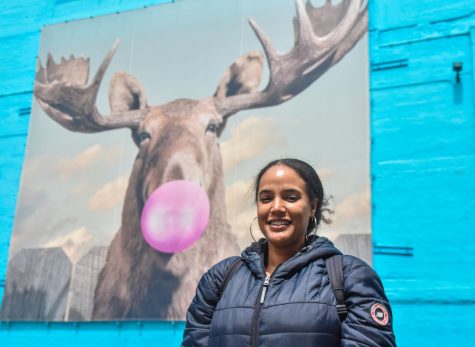Campus student veterans group re-forms for first time since pandemic
April 28, 2023

DEI ISSUE
Columbia students who are military veterans may have lost their fight for a dedicated campus meeting space, but they have regained their status as an officially recognized school group.
The Columbia chapter of the Student Veterans Association met in April for the first time since the group dissolved during the pandemic.
“We are important because we are a resource for other students,” said Rosemary Morillo, a Marine veteran and journalism major. Morillo is the president of the newly formed group.
Because veterans have adult backgrounds and life experiences, she added, they can be people that younger students look up to or reach out to if they need help.
The veterans group lost its official recognition several times over the last five years when members graduated and the remaining students struggled to meet all of the requirements.
The pandemic made things especially hard, veterans told the Chronicle.
“Student-veterans are unlike other students at college and universities,” said Emilly Olivares, who was president of the veterans group from September 2021 to May 2022. Olivares, a Marine veteran, graduated from Columbia in December 2022 with a degree in creative writing.
The way active-duty personnel are perceived by younger generations can be unfriendly. That’s why it’s important for veterans to have their own space, she said.
Veterans had their own meeting space until the Student Veterans Society was added Student Diversity and Inclusion’s space on the fourth floor at 618 S. Michigan in 2018.
Student-veterans told the Chronicle at the time that it was difficult to engage with non-military students in the SDI space.
When the veteran regroup officially reorganized that year under faculty advisor Jackie Spinner, an associate professor in the Communication Department and former war correspondent, the Communication Department donated space for the veterans that was used until the start of the pandemic. The lounge on the 2nd floor of the 33 E. Ida B. Wells building has since closed.
Spinner served as advisor to the group until 2022. The new faculty advisor is Tom Nawrocki, an associate professor in the English and Creative Writing Department. Nawrocki is a Marine veteran.
“Designated student-veteran centers at other colleges and universities are often multi-purpose spaces serving as safe places for veterans with support from staff, faculty, VA liaisons or other student-veterans,” Olivares said. “Establishing a space like this highly depends on the level of support from colleges.”
Olivares noted that on Columbia’s academic DEI website and mission statement, the word veteran is not present.
Kari Sommers, associate dean for Student Life, did not respond to several email requests for comment.
The process for attaining officially recognized status for clubs and associations at Columbia College Chicago is labor-intensive, which is one of the reasons the vet group has struggled to maintain its status over the years.
“It was a lot of paperwork to do,” Morillo said.
The Student Veterans Association has now identified its first order of business.
“Our primary goal is to attract student-veterans,” said former Army Sgt. and combat veteran Michael Koppenhoefer, a senior photography major.
Because most student-veterans are non-traditional students, life schedules are different from younger students’ so their time must be used efficiently to define what we will do in the future, he said.







